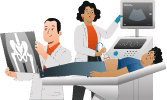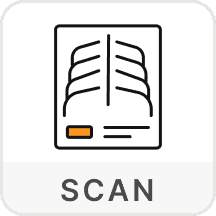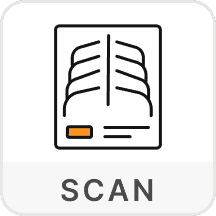near you Trusted by +
Patients Across India

Dexa Scan (2)
Starting from₹3850
FAQs
What is a DEXA scan?
A DEXA scan test, also known as a bone density test, is a non-invasive diagnostic procedure that measures bone mineral density using low-dose X-rays. It helps assess bone strength and the risk of osteoporosis or fractures, particularly in the hip and spine.
How long does a DEXA scan take?
A DEXA scan test typically takes 10 to 30 minutes to complete. The exact duration may vary depending on the area being scanned. During the test, you will be asked to lie still while the scanner arm moves over your body.
What can I expect during a DEXA scan?
During a DEXA bone scan, you will lie on a padded table, and a scanning arm will pass over the hip, spine, wrist, or full body. The procedure is painless and non-invasive. You may be required to remove jewellery or clothing with metal fasteners.
How can I find a DEXA scan near me?
To find a DEXA scan test near me, search online using phrases like "book DEXA scan test" or "DEXA scan test cost near me." You can also check with local hospitals and diagnostic centres or ask your doctor for recommendations.
What does a DEXA scan report look like?
A DEXA scan report contains images of the scanned areas and a radiologist's interpretation. Results are given as T-scores and Z-scores, which compare your bone density with healthy adults and people of your age group. Your doctor will use the report to assess your bone health.
Is a DEXA scan safe?
Yes, a DEXA scan test is safe and painless, with minimal radiation exposure. However, if you are pregnant or suspect pregnancy, inform your doctor, as X-ray radiation could pose risks to the foetus.
What is the DEXA scan test cost?
The DEXA scan test cost varies by location and provider. In metro cities the DEXA scan test price typically ranges higher than the two-tier cities. To check the ‘DEXA scan test price near me’, contact your local hospital, clinic, or diagnostic centre.
Why is a DEXA scan performed?
A DEXA scan test is used to diagnose osteoporosis, detect bone loss, assess fracture risk, and monitor osteoporosis treatment effectiveness. It helps doctors evaluate overall bone health and recommend the right care plan.
Who should get a DEXA scan?
Women above 65 years and men above 70 years should consider a DEXA scan test. People with risk factors such as low body weight, a family history of osteoporosis, smoking, or prolonged use of certain medications should also undergo a bone density test.
Can a DEXA scan predict fractures?
A DEXA scan test can help estimate the risk of fractures by measuring bone density. However, other factors like age, gender, and previous fractures also play a role. Your doctor will analyse the results to provide a comprehensive bone health assessment. To book DEXA scan test, compare DEXA scan test costs near me, or find affordable DEXA scan test prices.


